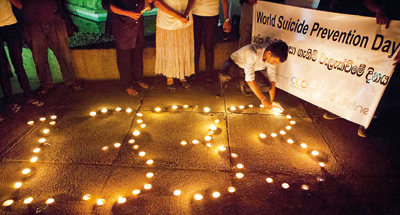They will give ear with courage, compassion and commitment
At a time when Sri Lanka’s suicide rate remains a concern, just handing someone that 1333 number could make a difference in a life lost or saved. 1333, the CCC Foundation’s Hotline currently receives around 1200 calls every month. Waiting by the receiver is a team of volunteer counsellors. They speak Tamil, Sinhala and English and each have been trained to help someone who is considering taking their own life. The phone counselling hotline can be accessed from anywhere in the island, on any phone network entirely free of charge between the hours of 9 a.m. and 9 p.m., 365 days a year.

A light to their lives: CCC Foundation volunteers lighting lamps outlining their hotline number to mark World Suicide Prevention Day on September 10
The 3 Cs in the CCC Foundation stand for Courage, Compassion and Commitment. The non-profit organisation is primarily known for their work with cancer patients, having been founded in 2003 to assist the National Cancer Institute (NCI) in Maharagama. Their particular focus has been on children with the disease and they’ve raised funds toward infrastructure improvements and recruited experts to help improve on the treatment available at NCI. Most notably, the CCC House on the NCI premises is the largest fully operational cancer transit home in Sri Lanka.
The Hotline service was begun in 2009. The organisation places the national suicide figures at an average of 12 people every day, a number that is multiplied many times if you consider those who try and fail. For the team behind it (which includes CCC ambassador Kumar Sangakkara) something just had to be done.
The counsellors who have since been trained were taught key approaches by ‘Lifeline in Australia and NZ’ who run a similar service in those countries says Tusitha Kumarakulasingama, Committee Member at the CCC Foundation. “Our model is a ‘non-directive, non-advice providing’ method, which means we don’t tell them what to do, we guide them through a process which helps them discover alternative options to the current problem,” she adds. “By this model we empower the caller to build self-worth and strength which would help them take action.”
For the volunteer counsellors it’s a challenging process and it requires they develop their ability to empathise and offer subtle guidance. “They go through an extensive training which covers the skill set to identify the caller’s frame of mind and then be able to help them,” says Tusitha. Occasionally a counsellor will feel that a caller needs more support, in which case he or she will direct the latter to a relevant person/organization in close proximity to where they live. An extensive data base used for this purpose is a source of invaluable recommendations.
While a caller may be considering suicide, the counsellors know that this “is just the tip of the ice burg.” The team have discovered time and again that the real problem is that a person may simply feel overwhelmed by pressing personal challenges. “The issue is the person doesn’t have the capacity to rationally approach the real issue and look for alternatives, they need to have a support system which can take them through that journey.”
When family and friends are unable to provide this support, things can take a turn for the worse. Often the threat of suicide isn’t taken seriously until it’s too late.
“The other biggest issue is the social stigma associated with it, when one member takes his life the rest of the family has more issues to face socially, they are considered as a social liability by the world,” says Tusitha, explaining that often the family is on the receiving end of suspicion and condemnation.This is in part because misconceptions around suicide extend to the notion that it runs in the family and that those who commit suicide are generally weak or even insane.
Dismissing the first assumption as incorrect, Tusitha addresses the second explaining that even otherwise strong people can be reduced by difficult circumstances. “With the correct intervention you can give them the strength to live,” she says, adding, “We as a team encourage the family and friends to ‘Listen, encourage them to talk, and seek help when necessary’.”
CCC has so far relied on media and personal recommendations to spread the word, but they’ve also begun to do a lot of awareness raising at the grassroots level. (The CCC centre receives an average of 35 calls a day that come from all over Sri Lanka. The organisation’s statistics show that a majority of these are from the Western Province.) Funding remains the province of dedicated teams in Australia and Sri Lanka who campaign tirelessly for the cause, says Tusitha who identifies the twin issues of raising awareness and money as the “constant challenges” they face as a team.
However, their ambitions for the future remain untrammelled. “We are currently working on expanding the lines, SLT has been supporting us right from the beginning – they provide the infrastructure and the lines,” says Tusitha. In the meantime, every call continues to offer a rare opportunity to change a life for the better.
For more on the CCC Foundation visit http://cccfoundation.org.au/
comments powered by Disqus

